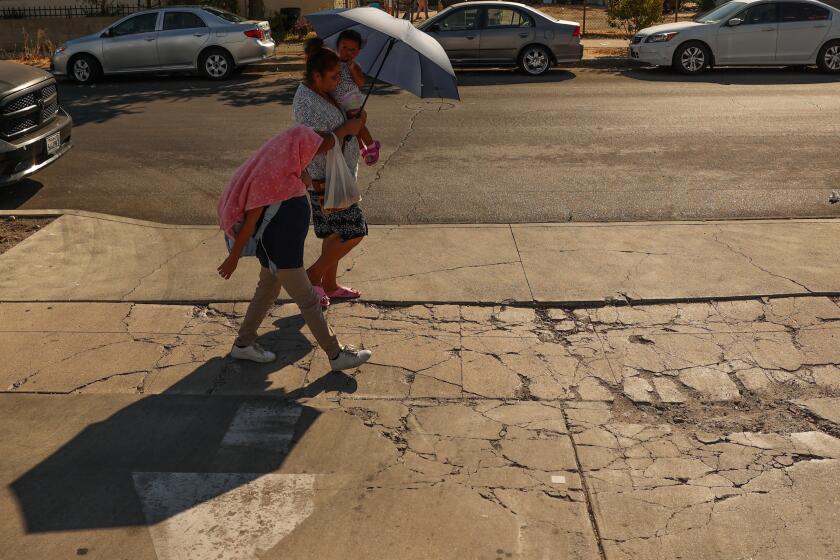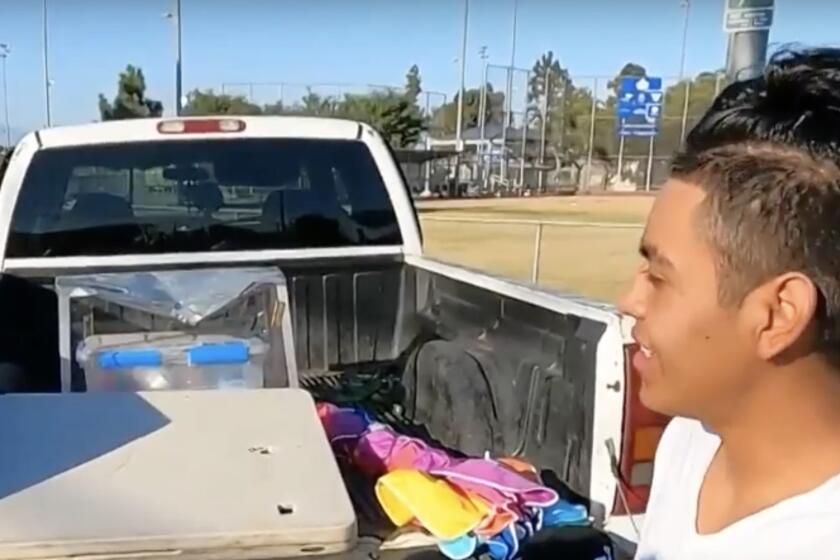Panel Faults LAPD Over Pace of Reforms
Frustrated by costly delays, a Los Angeles City Council committee scolded police leaders Monday for failing to complete a computerized officer-tracking system at the heart of a courtordered reform decree.
In response, a top official pledged that the Los Angeles Police Department would comply with all aspects of the reform order by Jan. 1.
The council’s Public Safety Committee conducted a special hearing on the reforms with the Police Commission on Monday amid concern over a federal judge’s decision last week to extend the consent decree by three years because full compliance had not been reached during the original five-year term.
A key reform not yet implemented is a computer system called TEAMS II, which is intended to track officer actions to help supervisors identify problems, said Councilman Jack Weiss, the committee’s chairman.
“There is no excuse for the lack of progress on TEAMS II,” Weiss said. “If this had been L.L. Bean or Eddie Bauer and they had tried to develop a computer system to track their employees and their customers, it would have been done 4 1/2 years ago. Government has been inept in dealing with something that the private sector is mastering.”
The city’s attorneys had told U.S. District Judge Gary A. Feess last week that the LAPD would comply with all reforms mandated by the consent decree, including TEAMS II, by September.
On Monday, Gerald Chaleff, civilian chief of the LAPD’s Consent Decree Bureau, was called to explain when the system would finally be in place.
LAPD officials, he said, have “a projection of some time in August. I always like to add time on because of my dealings with computer systems, and that is why I gave a date of Jan. 1,” Chaleff said.
Because all reforms must be in place for two years before the decree can be lifted, the timetable outlined Monday would allow the city to petition the court to lift the court monitoring by the start of 2009 -- six months ahead of the newly extended schedule.
Councilman Ed Reyes said he was disappointed that the city would have to pay $1.6 million or more annually to independent monitor Michael Cherkasky’s firm during the extended period.
“I wish we could have done it in five years,” Reyes said “I’m glad we are finally drawing the line and saying this is it.”
With work on TEAMS II far from complete, the council panel also recommended Monday that the city extend a $12.1-million contract with Sierra Systems Group Inc. to develop the system. The council members also agreed to recommend increasing the contract by $1.5 million.
Chaleff told the council members that the attorneys who negotiated the mandate in the consent decree underestimated how hard it would be to implement TEAMS II.
“You shouldn’t have lawyers decide what a computer system is going to look like,” Chaleff told the panel.
TEAMS II was designed to provide LAPD supervisors with each officer’s record on arrests, citizen complaints, lawsuits, uses of force, shootings, commendations, assignments, workers’ compensation claims and other matters.
“It is a tremendously powerful tool that will give us the opportunity to determine productivity standards around the department and to evaluate our supervisors and managers about how well they are managing their subordinates,” Deputy Chief David Doan said.
Council members appeared unmoved by the repeated assertion that perfecting the computer system turned out to be more difficult than expected.
“I appreciate the complexity of the system that you have been developing,” Weiss told Doan. “I’m sure you appreciate why all of us here, and the police commissioners, we just cannot emphasize enough how much the timely completion of this system means to this city and this department.”
But Doan responded that a system with the ability to affect a police officer’s career can’t be rushed. “The key for us is it needs to be accurate and done right,” Doan said.
LAPD officials have said the city is in compliance with about 70% of the 191 reforms mandated by the consent decree.
“We haven’t achieved compliance, but we are a long way from where we were five years ago,” Chaleff told the group.
However, Police Commissioner Anthony Pacheco joined the council members in voicing concern about what has not been completed.
“The concern that I have is that with the extension of the consent decree, that we may not move fast enough to get to where we need to go,” Pacheco said. “It seems to me the TEAMS issue has been with us a considerable period of time and, yes we’ve made some progress, but we have quite a distance to go.
“All of that to me suggests we need to move forward quickly,” he added.
More to Read
Sign up for Essential California
The most important California stories and recommendations in your inbox every morning.
You may occasionally receive promotional content from the Los Angeles Times.











